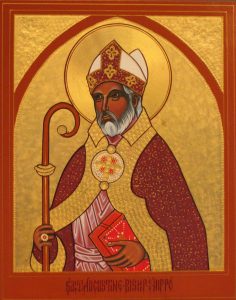WEEK 21 01
Memorial: St. Augustine
(1 Thes 1:1-10; Ps 149; Mt 23:13-22)
***************************************
The problem of addicts is not that they think they are worms, nor that they think they are special. Their problem is that they think they are very special worms! This cute saying actually fits in with today’s liturgy.
Usually, liturgists aim for some connection between the gospel and the first reading. Today’s readings, however, are linked more by their contrast to one another than by any connection.
They both end up with the same message, however, like two sides of a coin: to put our faith in the God of Jesus Christ, to let go of any idolatry or addiction in our lives, and to lead lives of expectant hope.
In the first reading, Paul’s words to one of his favorite communities, the Thessalonians, gives us the positive side of the message. He praises them for their faith in the one true God, for turning away from all the idol worship that surrounded them and for their expectant, hopeful waiting for the second coming of the risen Lord, Jesus Christ.
We see the flip side of this in the Gospel, where Jesus upbraids and chastises the scribes and Pharisees for their unbelief, their hypocrisy and for turning their faith into a self-serving religion that actually prevents others from a genuine life of faith in God.
The message is clear – on the one hand, we are to avoid the unbelief, the hypocrisy and the deceptive, addictive religiosity of the scribes and Pharisees, and on the other hand, we are to emulate the Thessalonians in their genuine faith, their conversion of heart, and their living hope in the coming of Christ.
Like the Thessalonians, our belief must also be a “work of faith in God the Father and the Lord Jesus and a labour of love and steadfastness of hope in our Lord Jesus Christ.”
Like them, we must also practice the spirituality of letting go, of turning away from any idols or false gods in our lives. Those idols will be for us the same ones that faced the Israelites in the desert, the same ones that the scribes and Pharisees succumbed to centuries later: possessions and pleasure, prestige and fame, power and control. The Big Book of Alcoholics Anonymous puts it more simply: we are to turn away from abusing and becoming addicted to money, fame and power. These are the false gods that surround us on every side, tempt us, control us, addict us and even destroy us.
Like the Thessalonians, we are to wait for the Son of God from heaven, whom the Father raised from the dead. In his book Knowing Jesus, James Alison O.P. highlights three essential characteristics of the resurrection of Jesus – gratuitousness, forgiveness and mission. He stresses that Jesus is not just “one risen from the dead,” but the “crucified-risen-one” who as such reveals the whole meaning of the Old Testament prophecies.
Finally, like the Thessalonians, we are to wait for Jesus to come again, to keep vigil. To keep vigil is to wait for some event or someone to come into our lives to bring wholeness, completion, fullness. That will happen in the Parousia, when Jesus comes again to bring all things to their completion.
Today, we are also invited to reflect on how we can imitate St. Augustine whose memorial we celebrate. He truly lived the first reading and is an antidote to the scribes and Pharisees in the gospel. After a wild and somewhat dissolute life in his youth, St. Augustine finally came to believe in the one true God of Jesus Christ. He turned away first from unbelief, then heretical belief and an irregular relationship, and lived a life of expectant hope and faith in Jesus Christ as the risen-crucified-one. His conversion and his subsequent teaching has had a profound influence on the Church. Who could forget his sayings such as “Late I have loved thee,” or “Our hearts are restless until they rest in thee” and “Love and do what you will” that still resound in our lives today.
The Eucharist is one of the best ways for us to “keep vigil.” We say or sing after the consecration, “We proclaim your death, O Lord, and profess your resurrection, until you come again.”

St Augustine
May our celebration help us to imitate and emulate both the Thessalonians and St. Augustine in their faith, their turning away from idols, and their lives of expectant hope in Jesus Christ, the crucified-risen-one.



